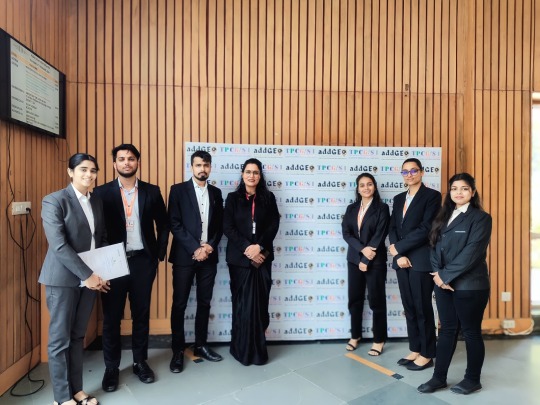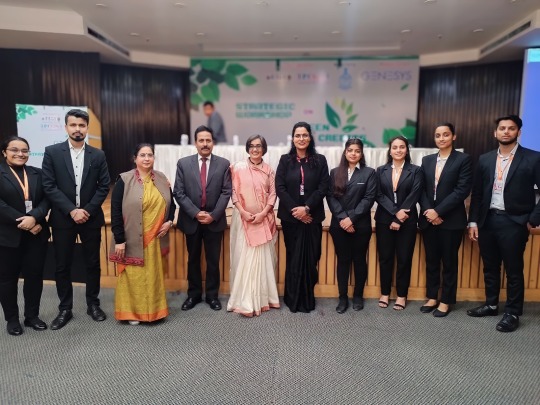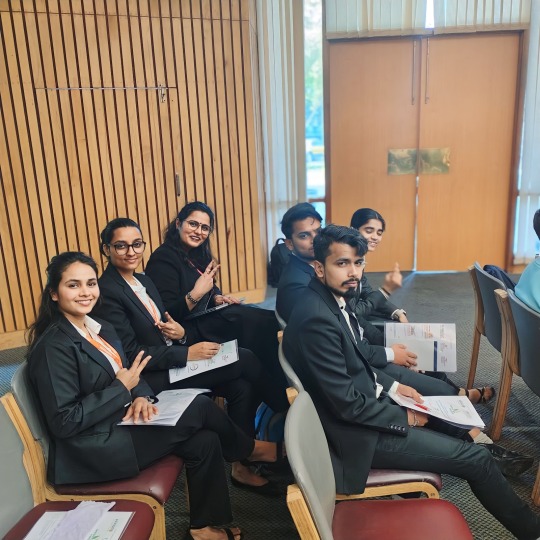#regenerativeeconomy
Photo





Conheça o belo trabalho da @dreamvillageghana , uma comunidade regenerativa localizada em Dambai, Gana - África e tem como pilares a criação de comunidade, a troca de saberes, a agricultura e a educação.
#regenerativeagriculture#regenerativeeconomy#generationrestoration#ruraldevelopment#Greengoldghana#Dreamvillageghana#treeplanting#smallholderfarmers#coffee#COCOBOD
5 notes
·
View notes
Video
youtube
Perma Tokens with Terry Mollner
#youtube#permatokens#terrymollner#sustainableinvesting#ethicalfinance#regenerativeeconomy#socialimpactinvesting#consciousinvesting#ecofriendlyfinance#tokenization#blockchaininvesting#impactfulfinance#holisticinvesting#circulareconomy#greenfinance
0 notes
Text
Conference






Students of MBA Department along with Dr. Ritu Soryan (HOD MBA) and Prof. Dr. BMK Prasad, Director General, Dronacharya Group of Institutions, Greater Noida attended the "Strategic Workshop on GeoWwise Green Credits: India's Pioneering Initiative" held at India International Centre, New Delhi on 8th February, 2024. Dr. Yogita Shukla, CEO of the addGEO Foundation, warmly welcomed the students.
The aim of the conference is to delve into the nuances of how geospatial information and technology is fundamental to robust water resource management and help communities earn green credits.
#greencredits#geospatialtechnology#geospatialdata#regenerativeeconomy#technology#mbadepartment#students#college#engineeringcollege#g20#cbseboard#delhincr#aicte#aktu#topprivateengineeringcollegeingreaternoida#bestengineeringcollegeindelhincr#DronacharyaGroupofInstitutions#multipleplacement#greaternoida#uttarpradesh
1 note
·
View note
Video
youtube
Rethink, Reduce, Reimagine: The Magic of the Circular Economy (Watch Now!) ♻️✨
In the dance of transformation, waste becomes wealth. Imagine a world where our “throw-away” culture is replaced by a system that keeps resources in use, minimizes waste, and even regenerates our planet. This is the power of the Circular Economy, and it’s not just a dream — it’s happening right now!
Did you know? Up to 80% of a product’s environmental impact is determined at the design stage! The Circular Economy challenges us to move beyond “planned obsolescence” and design products for disassembly. Think cell phones — wouldn’t it be amazing if those valuable metals were easily recovered and reused, instead of ending up in landfills?
But it’s not just about design. Businesses need to optimize resource use at every stage of production. Dutch carpet manufacturer Interface is a shining example. They’ve developed a closed-loop system where used carpets are disassembled and the materials — like nylon and limestone — are reborn into new carpets. Brilliant!
Collaboration is key. The Circular Economy thrives on partnerships across the supply chain. Imagine a power plant that uses CO2 emissions to help a nearby greenhouse flourish, and that greenhouse in turn provides biomass for energy production. A win-win for everyone!
Ready to unleash the magic of the Circular Economy? Watch our new video, “Recycling Magic: Unleashing the Circular Economy,” and discover inspiring examples of companies putting these principles into action. From fashion-as-a-service that reduces clothing waste to regenerative agriculture practices that heal the soil, the Circular Economy offers a powerful path towards a more sustainable future.
Join the movement! Subscribe to our YouTube channel for more inspiring content, and follow us on LinkedIn to stay informed about the latest circular economy innovations.
Let’s turn trash into treasure, together! ♻️✨
Watch the video here: Recycling Magic: Unleashing the Circular Economy…: https://lnkd.in/esRpAPcA
Subscribe to our YouTube channel: Global Empowerment Leadership: https://bit.ly/3SEd7XQ
Follow us on LinkedIn: Global Empowerment Leadership: https://bit.ly/3vFDdC4
#CircularDesign #Sustainability #GlobalEmpowermentLeadership #Recycling #WasteReduction #RegenerativeEconomy
0 notes
Text
Cassetex wins Climate Launchpad 2020

More than 3,000 entrepreneurs from 56 countries participated in the ClimateLaunchpad 2020. This year’s global climate competition took place online from 30 September to 2 October.
The winner, Cassetex, is a solar-powered battery swapping service for electric 3-wheelers in Bangladesh. The team hopes to transition more than one million vehicles and save 0.47 megaton of CO2 per year. “Being amongst the top start-ups in the world is a tremendous recognition for Cassetex and Bangladesh. The transport sector is one of the biggest contributors to climate change and one of the toughest sectors to bring change to. We are humbled by this award, and we hope it will help us solve the critical challenges in the transport sector in Bangladesh,” says Gopal Kumar Mohoto, Co-Founder and CTO of Cassetex.
https://www.climate-kic.org/news/cassetex-bangladesh-sosei-uruguay-carbon-craft-design-india-win-the-seventh-edition-of-climatelaunchpad/
#electricmobility#solar#sustainability#cleantransport#Bangladesh#batteryswapping#lastmiletransport#renewables#renewableenergy#electricvehicle#battery#swap#3wheeler#tuktuk#regenerativeeconomy#regeneration#carbonemissions#carbonreduction#environment#clp20#climatechange#climatechangemitigation#climatelaunchpad#climatekic
0 notes
Photo

peace everyone, below you will find the full quote from my talk at the Marin Center in northern Cali this past fall at the @bioneers conference repping @cooperationjxn and our emerging network of worker #cooperatives, and #solidarityeconomy institutions working to develop a #regenerativeeconomy and #participatorydemocracy in Jackson Mississippi. def feel like some jewels were shared in relation to experimenting with democratic structures and building a #sustainable community. i’ve included a link in my bio in case anyone is interested in seeing the full talk. w/ love peace and power ~brandon “this country in many ways talks about democracy, but we don’t know how to do it. it takes a deep level of patience and trust in each other that we’re going to come up with the best decision. the exploitative economy that values bosses is able to get things done quicker. when all of us get to decide, we move slower. the problem is that with climate change, we don’t have much time. so how do we hold each other? how do we be democratic? how do we learn to share resources? all of those things we’re trying in Jackson.” https://www.instagram.com/p/B7v7227gs_aWJI5edMbrbDCe-BfMiCGPo6NBg40/?igshid=1mmsxbtfj8mqz
0 notes
Photo


Zaterdag 22 augustus – Bioregional Pathways to Regenerative Economies. Filmpje van Kosmos Journal, gebaseerd op de woorden van John Fullerton, bedoeld ‘to support and amplify the essential work of building resilient, regenerative bioregional economies’. De beelden zijn nogal clichématig, maar de teksten zijn erg to the point en mooi. Elegant zou ik bijna zeggen.
0 notes
Link
2 notes
·
View notes
Text
Cooperation Jackson’s new broadsides
Check out our EcoVillage broadside. #EcoVillage #FannieLouHamer #JackonRising #RegenerativeEconomy pic.twitter.com/Y6h7jlD0EB
— Cooperation Jackson (@CooperationJXN) August 23, 2019
7 notes
·
View notes
Text
Documentary Review: A New Economy
A New Economy takes a look at how real companies are modelling the regenerative economy through co-operative ownership and collaborative business models. London Brewing Co-op was one of the most heavily featured businesses. Last Saturday, LBC founder David Thuss ran a workshop on business cooperatives at the Ivey Social Impact Conference. He described the iterative process of decision-making in his cooperatively owned brewery. A few points stood out to me during the discussion.
1) Is co-operative decision-making feasible when decisions are time-sensitive?
2) Is co-operative decision-making scalable, to other, larger types of businesses?
3) What are the barriers to a truly democratic process? Can a ‘democratic’ process be achieved in a society that is fundamentally unequal? (i.e. where the flow of information is obstructed by biases such as representation in the media)
While provoking the discussion, David didn’t claim to have the answers to these questions. What he did have was an example of a co-operatively owned business that had experienced substantial growth since its inception and continued to be functional, employing and providing for community-members and supporting local, organic farmers. A New Economy emphasizes that this model harnesses the benefits of circulating money and materials in a local economy. This small business model admittedly cannot compete with large corporations on price, and quality may vary between seasons due to weather conditions. The scalability of the cooperative model to large CPG companies is questionable. Maybe this is an indication that small businesses are better able to create positive social impact? (Or does it mean that big players gained their footing in the industry by cutting corners in terms of environmentalism and exploiting workers?) The documentary also describes that the co-operative takes care of its employees in a way that other businesses don’t – it can adapt practices to the parental leaves of two staff-members by collaboratively finding out what accommodation works best for their family. Perhaps co-operative decision-making has more potential to create greater justice around work-life balance, especially for individuals who need time for their families.
Other businesses featured include:
- The Red Victorian - an accommodation in Haight-Ashbury SF
- Sole Food Street Farms - an urban farm in East Vancouver that employees individuals that experience difficulty maintaining traditional employment due to addiction, mental health or other barriers
- Sensorica – open source hardware development company
- Thorncliffe Park – an east Toronto park where women from immigrant communities earn supplemental income by selling products from their home countries, homemade goods, and food
- Loomio – an online platform that allows groups of people to make collaborative decisions (London Brewing Co-op actually uses this platform!)
A couple notable experts featured include:
- Gar Alperovitz – American political economist and historian. Author of America Beyond Capitalism
- John Fullerton - founder and president of Capital Institute,[1] "a collaborative working to explore and effect economic transition to a more just, regenerative, and thus sustainable way of living on this earth through the transformation of finance." Author of Regenerative Capitalism
- Richard Sennett – academic studying capitalism and society
Overall, the point the resonated the most with me in the documentary was that supporting the regenerative economy isn’t an argument for capitalism or socialism, it’s the attempt at a smooth transition towards a system that is environmentally sustainable and minimizes social friction – the system that will inevitably have to win out if we are going to continue function as a society. It’s Darwinism with the understanding that business models will survive not because they are the ‘fittest’ in the sense that they are strongest at maximizing profit, but that they have the best ‘fit’ with the overall system, that includes the necessity of environmental sustainability, and the basic human need to live in community and collaborate for the greater good.
0 notes
Video
youtube
Welcome to our first video in 2024, where we dive into a compelling case study on how industrial symbiosis accelerates carbon neutrality through regional cooperation. In this video, we explore the intersection of sustainability and interdisciplinary leadership, highlighting the urgent need to achieve internationally agreed sustainability goals like the Paris Agreement and UN Sustainable Development Goals. At Global Empowerment Leadership, we take pride in presenting our highly anticipated 2024 newsletter series. Last year, we delved into pressing sustainability challenges, such as green growth, climate action, and empowerment through education. This year, our focus shifts towards circular economy strategies—a realm of innovative, cross-sector solutions that hold immense promise for global sustainability. The circular economy represents a systemic shift away from the traditional 'take-make-waste' linear model towards an industrial system designed to be restorative and regenerative. By optimizing resource use through techniques like reuse, repair, refurbishment, remanufacturing, and recycling, the circular economy aims to decouple economic activity from finite resource consumption and minimize waste generation. This holistic and multidimensional approach offers opportunities across industries and communities to eliminate waste and foster environmental stewardship. Throughout our 2024 newsletters, we will delve into major themes such as urban industrial symbiosis, sustainable minerals and materials management, and circular business model innovation. We are excited to present cutting-edge case studies and research that will assist industry, government, and civil society in their journey towards a truly regenerative and inclusive economy. We encourage you to share your perspectives on social media using the hashtag #CircularEconomyLeadership to facilitate ongoing conversations throughout the year. If you haven't subscribed to our newsletter series yet, simply click here: [Insert subscription link]. Join us as we explore our first circular horizon—unveiling the role of industrial symbiosis in reducing carbon emissions and supporting carbon neutrality goals. Subscribe to Global Empowerment leadership: on Linkedin https://bit.ly/3vFDdC4 on Youtube https://bit.ly/3SEd7XQ GELS OPUs clips on industrial symbiosis: • Industrial Symbiosis Explained: Top 5... GEL’s Youtube video: Unleashing the Potential of the Inflation Reduction Act: Building a Sustainable Future • Achieving Harmony: Balancing Environm... Rev Opus Clips 2 Accelerating Progress Toward Global Sustainability: Exploring Circular Economy Strategies: • Exploring Circular Economy Solutions ... Don't forget to use the following hashtags to engage with our content: #CircularEconomy #IndustrialSymbiosis #CarbonNeutrality #Sustainability #UNSDGs #ClimateAction #GreenGrowth #RegenerativeEconomy #CircularBusinessModels #UrbanIndustrialSymbiosis #SustainableMaterialsManagement #GlobalEmpowermentLeadership #2024NewsletterSeries #InterdisciplinaryLeadership #CaseStudy #ResourceUse #WasteReduction #NetZeroEmissions #CircularDesign #Collaboration #MultistakeholderEngagement
0 notes